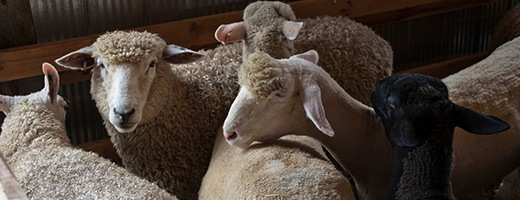The goal of Canada's National Scrapie Eradication Program (NSEP) is to eliminate classical scrapie from the national sheep flock and goat herd. This protects animal health and maintains confidence in Canada's sheep and goat industries around the world.
Our approach
Our internationally recognized and science-based approach includes:
- identifying the remaining scrapie infected flocks or herds in Canada through our surveillance program
- implementing scrapie disease control actions on farms where scrapie is found
- providing support to a Scrapie Flock Certification Program
At the Canadian Food Inspection Agency (CFIA), we impose strict regulations on the import of animals and animal products from countries where scrapie is known to occur. These regulations are enforced through port-of-entry inspections done either by us or the Canada Border Services Agency (CBSA).
Our response to an outbreak of scrapie
At the CFIA, when we confirm a scrapie-positive test result, we initiate science-based, internationally recognized disease control actions right away. They usually include the following:
- strict quarantine and animal movement controls to prevent disease spread
- humane destruction and disposal of all infected and high-risk animals
- investigation of potentially infected or high-risk small ruminants (sheep and goats) that could spread the disease to new premises, and investigation of potential source farms
- strict cleaning and disinfection of the infected premises
- requirement for follow-up surveillance of dead sheep and goats
Owners whose animals are ordered destroyed may be eligible for compensation.
Genetic resistance to scrapie
Sheep of certain genetic types are less likely to become infected with scrapie. A blood or tissue test can determine the genetic susceptibility of a sheep to scrapie. Producers who want to minimize the risk of scrapie in their sheep flock can consider selective breeding for genetic resistance to scrapie.
Information released in 2021 indicated there are certain genotypes in goats that may be more resistant to scrapie. Goat producers may also start selectively breeding for scrapie resistance in their herd.
Alternatively, sheep producers and goat producers can:
- maintain closed herds/flocks
- purchase animals from flocks or herds in a scrapie flock certification program
- test mature dead sheep and goats for scrapie
Specific efforts towards managing the risk of scrapie on individual premises can be recognized through formal participation in the Scrapie Flock Certification Programs (SFCP).
In the absence of adopting specific measures to minimize the risk of scrapie on their farm, we encourage producers to set up general good management and biosecurity practices such as:
- individual animal identification
- record keeping
- prompt isolation of sick animals
- separation of females giving birth
- increased cleanliness of the birthing environment
- disinfection of equipment between animals
- single-use needles for injections
